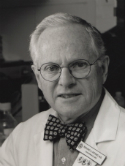Suberoylanilide hydroxamic acid, an inhibitor of histone deacetylase, suppresses the growth of prostate cancer cells in vitro and in vivo Journal Article
| Authors: | Butler, L. M.; Agus, D. B.; Scher, H. I.; Higgins, B.; Rose, A.; Cordon-Cardo, C.; Thaler, H. T.; Rifkind, R. A.; Marks, P. A.; Richon, V. M. |
| Article Title: | Suberoylanilide hydroxamic acid, an inhibitor of histone deacetylase, suppresses the growth of prostate cancer cells in vitro and in vivo |
| Abstract: | Suberoylanilide hydroxamic acid (SAHA) is the prototype of a family of hybrid polar compounds that induce growth arrest in transformed cells and show promise for the treatment of cancer. SAHA induces differentiation and/or apoptosis in certain transformed cells in culture and is a potent inhibitor of histone deacetylases. In this study, we examined the effects of SAHA on the growth of human prostate cancer cells in culture and on the growth of the CWR22 human prostate xenograft in nude mice. SAHA suppressed the growth of the LNCaP, PC-3, and TSU-Pr1 cell lines at micromolar concentrations (2.5-7.5 μM). SAHA induced dose-dependent cell death in the LNCaP cells. In mice with transplanted CWR22 human prostate tumors, SAHA (25, 50, and 100 mg/kg/day) caused significant suppression of tumor growth compared with mice receiving vehicle alone; treatment with 50 mg/kg/day resulted in a 97% reduction in the mean final tumor volume compared with controls. At this dose, there was no detectable toxicity as evaluated by weight gain and necropsy examination. Increased accumulation of acetylated core histones was detected in the CWR22 tumors within 6 h of SAHA administration. SAHA induced prostate-specific antigen mRNA expression in CWR22 prostate cancer cells, resulting in higher levels of serum prostate-specific antigen than predicted from tumor volume alone. The results suggest that hydroxamic acid-based hybrid polar compounds inhibit prostate cancer cell growth and may be useful, relatively nontoxic agents for the treatment of prostate carcinoma. |
| Keywords: | controlled study; unclassified drug; human cell; histone deacetylase inhibitor; drug efficacy; nonhuman; antineoplastic agents; antigen expression; prostate specific antigen; animal cell; mouse; animal; mice; cell death; cell division; enzyme inhibition; animal experiment; animal model; antineoplastic activity; tumor cells, cultured; mice, inbred balb c; prostate cancer; prostate-specific antigen; prostatic neoplasms; cancer inhibition; mice, nude; messenger rna; enzyme inhibitors; histone; transplantation, heterologous; hydroxamic acids; neoplasm transplantation; histones; histone deacetylases; histone deacetylase; growth inhibitors; suberoylanilide hydroxamic acid; hydroxamic acid derivative; human; male; priority journal; article; support, non-u.s. gov't; support, u.s. gov't, p.h.s. |
| Journal Title: | Cancer Research |
| Volume: | 60 |
| Issue: | 18 |
| ISSN: | 0008-5472 |
| Publisher: | American Association for Cancer Research |
| Date Published: | 2000-09-15 |
| Start Page: | 5165 |
| End Page: | 5170 |
| Language: | English |
| PUBMED: | 11016644 |
| PROVIDER: | scopus |
| DOI/URL: | |
| Notes: | Export Date: 18 November 2015 -- Source: Scopus |
Citation Impact
MSK Authors
Related MSK Work







